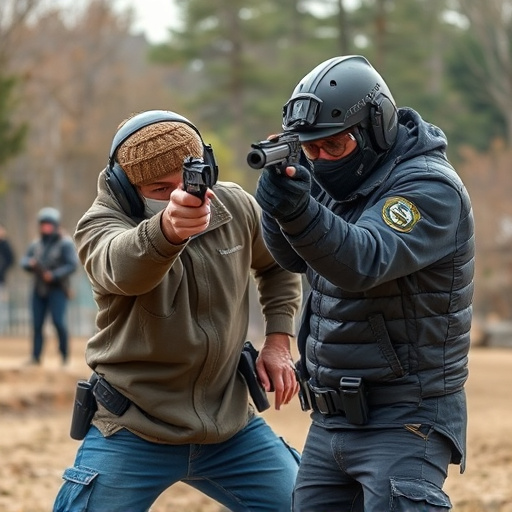Before acquiring rechargeable lithium stun guns, understand and comply with your state's unique laws regarding age restrictions, permit requirements, and allowed uses to avoid legal issues and ensure safety. Consult state-specific rules and stay updated on regulations, as laws vary widely from place to place.
In today’s world, civilians are increasingly considering the acquisition of self-defense tools like rechargeable lithium stun guns. This article explores the civilian taser ownership landscape, delving into state laws that govern these powerful devices. We break down the legal requirements for owning rechargeable lithium stun guns, guiding citizens through the intricate web of restrictions. By understanding these regulations, individuals can ensure compliance and make informed decisions regarding personal safety.
- Understanding State Laws on Civilian Taser Ownership
- Rechargeable Lithium Stun Guns: Legal Requirements by State
- Navigating Restrictions: Owning a Taser as a Citizen
Understanding State Laws on Civilian Taser Ownership

Understanding state laws on civilian taser ownership is crucial before considering the acquisition of a rechargeable lithium stun gun. Each U.S. state has its own set of regulations governing the possession and use of less-lethal self-defense devices, including tasers. These laws vary widely in terms of age restrictions, permit requirements, and allowed uses. For instance, some states allow citizens to carry tasers for personal protection without a permit, while others mandate specific training and licensing.
Knowing your state’s regulations is essential as it determines your legal rights and responsibilities when owning a taser. Rechargeable lithium stun guns, with their growing popularity for self-defense, must be used in accordance with local laws to avoid legal repercussions. Always check the latest updates on state legislation and consult with legal experts if needed to ensure compliance and personal safety.
Rechargeable Lithium Stun Guns: Legal Requirements by State

In recent years, the popularity of rechargeable lithium stun guns has surged among civilians seeking personal protection. This trend has prompted states to revisit and update their laws governing the ownership of such devices. When it comes to rechargeable lithium stun guns, each state has its own set of requirements and regulations. For instance, some states allow the open carry of these weapons without a permit, while others mandate that users possess a concealed carry license. Additionally, there might be restrictions on the power output or specific requirements for registration or background checks.
It’s crucial for prospective owners to understand the legal landscape before purchasing a rechargeable lithium stun gun. States like Texas and Florida have relatively lenient laws, allowing open carry without permit for certain types of stun guns. Conversely, states such as New York and California have stringent regulations, often requiring permits and specific models approved by local authorities. Therefore, anyone considering owning a rechargeable lithium stun gun should consult their state’s specific legal requirements to ensure compliance.
Navigating Restrictions: Owning a Taser as a Citizen

Navigating Restrictions: Owning a Taser as a Citizen
In the United States, the ownership and use of taser devices by civilians are governed by state laws, which vary widely from one state to another. This variability creates a complex landscape for individuals seeking to legally own and carry rechargeable lithium stun guns. Some states have relatively relaxed regulations, allowing private citizens to purchase and possess tasers without significant restrictions. These states often require a basic background check and may even permit open carry in certain contexts.
However, many other states impose stricter controls on taser ownership. This includes mandatory permits or licenses, specific training requirements, and limitations on where and how the devices can be carried. Some states also have restrictions on the power output of tasers, with higher voltage models often requiring more stringent regulations. Understanding these rules is crucial for prospective owners to ensure they are complying with local laws.
In conclusion, understanding state laws regarding civilian taser ownership is paramount when considering the purchase of rechargeable lithium stun guns. Each state has its own set of restrictions and requirements, making it essential for citizens to be informed before exercising their rights as responsible owners. By navigating these regulations, folks can ensure they are in compliance with local laws while also benefiting from the personal safety measures offered by tasers.
